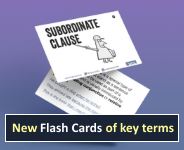Topic: Noun phrase
These resources cover noun phrases: phrases with a noun or pronoun as the Head word. Noun phrases can be quite short and simple, like this hat or an egg, but can also be built up into longer and more complex structures, like a very nice guy, every single person without a computer background or the woman who'd led them for their entire political career.
Englicious contains many resources for English language in schools, but the vast majority of them require you to register and log in first. For more information, see What is Englicious?

